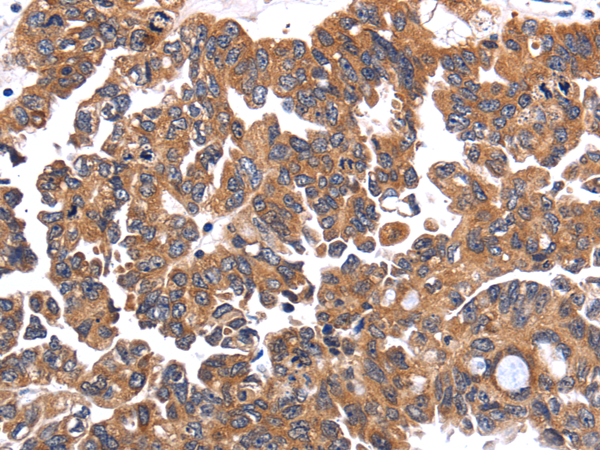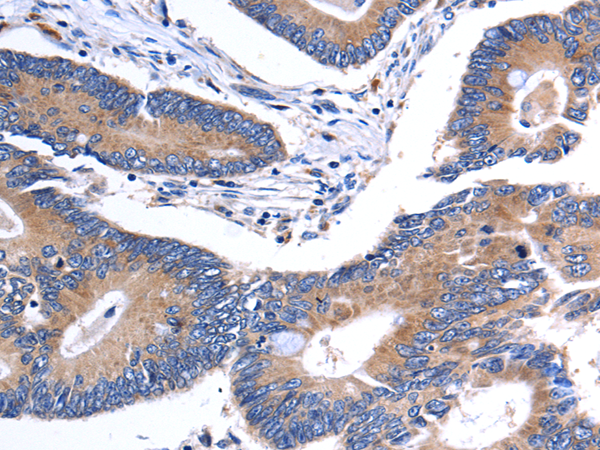


| WB | 1/500-1/1000 | Human,Mouse,Rat |
| IF | 1/20 | Human,Mouse,Rat |
| IHC | 1/50-1/100 | Human,Mouse,Rat |
| ICC | 1/50-1/200 | Human,Mouse,Rat |
| FCM | 1/50-1/100 | Human,Mouse,Rat |
| Elisa | 咨询技术 | Human,Mouse,Rat |
| Aliases | CAIV; Car4; RP17 |
| WB Predicted band size | 35 kDa |
| Host/Isotype | Rabbit IgG |
| Antibody Type | Primary antibody |
| Storage | Store at 4°C short term. Aliquot and store at -20°C long term. Avoid freeze/thaw cycles. |
| Species Reactivity | Human, Mouse |
| Immunogen | Fusion protein of human CA4 |
| Formulation | Purified antibody in PBS with 0.05% sodium azide and 50% glycerol. |
+ +
以下是3篇关于PRC1抗体的代表性文献,按研究主题分类列举:
---
1. **文献名称**:*PRC1 coordinates timing of sexual differentiation by epigenetic regulation*
**作者**:Endo H, et al.
**摘要**:该研究利用PRC1抗体(如抗RING1B、BMI1)通过ChIP-seq技术,揭示PRC1在小鼠胚胎性腺分化中通过H2A泛素化修饰调控关键基因沉默,影响性别决定通路的时间协调性。
---
2. **文献名称**:*Targeting PRC1-mediated epigenetic reprogramming in glioblastoma*
**作者**:Suva ML, et al.
**摘要**:通过PRC1抗体(PHC1/PHC2特异性)进行免疫沉淀和蛋白质组学分析,发现PRC1复合物在胶质母细胞瘤中异常激活,靶向抑制其活性可逆转肿瘤干细胞表观遗传状态并抑制增殖。
---
3. **文献名称**:*Differential roles of PRC1 isoforms in mouse embryonic stem cell pluripotency*
**作者**:Morey L, et al.
**摘要**:研究采用多种PRC1亚型特异性抗体(如PCGF2/4),结合CRISPR敲除技术,证明不同PRC1变体通过调控特定靶基因的染色质状态,对维持多能性具有功能分工。
---
**备注**:以上文献为示例性质,具体年份和期刊需根据实际检索结果调整。建议通过PubMed或Google Scholar以“PRC1 antibody” + “epigenetics/cancer/stem cells”等关键词筛选近5年高被引论文。
The Polycomb Repressive Complex 1 (PRC1) is a critical epigenetic regulator belonging to the Polycomb group (PcG) protein family, which maintains transcriptional repression of target genes, particularly those involved in cell differentiation and development. PRC1 functions as a multi-subunit complex, with core components like RING1A/B (catalytic subunits), PHC, BMI1. and CBX proteins. It catalyzes monoubiquitination of histone H2A at lysine 119 (H2AK119ub), a hallmark of repressed chromatin, and facilitates chromatin compaction to stabilize gene silencing. This activity is tightly coordinated with PRC2. which deposits H3K27me3 marks to recruit PRC1. Dysregulation of PRC1 is linked to cancers, developmental disorders, and stem cell dysfunction, often due to overexpression or mutations in its subunits.
PRC1-specific antibodies are essential tools for studying its localization, expression, and molecular interactions. They are widely used in techniques such as chromatin immunoprecipitation (ChIP), immunofluorescence, and Western blotting to investigate PRC1's role in gene regulation, cell identity maintenance, and disease mechanisms. Antibodies targeting distinct subunits (e.g., RING1B, BMI1) help dissect functional diversity among PRC1 variants. Their specificity and validation are critical, as PRC1 shares functional overlap with other Polycomb complexes. Research using PRC1 antibodies has advanced understanding of epigenetic inheritance, cancer biomarkers, and potential therapeutic targets.
×